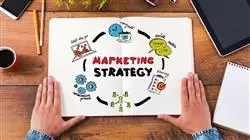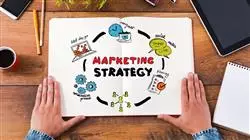University certificate
The world's largest school of business”
Introduction to the Program
With this specialization in Strategic Marketing, you will give a quality boost to your daily work, accessing better valued positions in any industry"

Why Study at TECH?
TECH is the world's largest 100% online business school. It is an elite business school, with a model based on the highest academic standards. A world-class centre for intensive managerial skills training.
TECH is a university at the forefront of technology, and puts all its resources at the student's disposal to help them achieve entrepreneurial success"
At TECH Global University
|
|
Innovation |
The university offers an online learning model that combines the latest educational technology with the most rigorous teaching methods. A unique method with the highest international recognition that will provide students with the keys to develop in a rapidly-evolving world, where innovation must be every entrepreneur’s focus.
"Microsoft Europe Success Story", for integrating the innovative, interactive multi-video system.
|
|
The Highest Standards |
Admissions criteria at TECH are not economic. Students don't need to make a large investment to study at this university. However, in order to obtain a qualification from TECH, the student's intelligence and ability will be tested to their limits. The institution's academic standards are exceptionally high...
95% of TECH students successfully complete their studies.
|
|
Networking |
Professionals from countries all over the world attend TECH, allowing students to establish a large network of contacts that may prove useful to them in the future.
100,000+ executives trained each year, 200+ different nationalities.
|
|
Empowerment |
Students will grow hand in hand with the best companies and highly regarded and influential professionals. TECH has developed strategic partnerships and a valuable network of contacts with major economic players in 7 continents.
500+ collaborative agreements with leading companies.
|
|
Talent |
This program is a unique initiative to allow students to showcase their talent in the business world. An opportunity that will allow them to voice their concerns and share their business vision.
After completing this program, TECH helps students show the world their talent.
|
|
Multicultural Context |
While studying at TECH, students will enjoy a unique experience. Study in a multicultural context. In a program with a global vision, through which students can learn about the operating methods in different parts of the world, and gather the latest information that best adapts to their business idea.
TECH students represent more than 200 different nationalities.

|
|
Learn with the best |
In the classroom, TECH teaching staff discuss how they have achieved success in their companies, working in a real, lively, and dynamic context. Teachers who are fully committed to offering a quality specialization that will allow students to advance in their career and stand out in the business world.
Teachers representing 20 different nationalities.
TECH strives for excellence and, to this end, boasts a series of characteristics that make this university unique:
|
|
Analysis |
TECH explores the student’s critical side, their ability to question things, their problem-solving skills, as well as their interpersonal skills.
|
|
Academic Excellence |
TECH offers students the best online learning methodology. The university combines the Relearning method (a postgraduate learning methodology with the highest international rating) with the Case Study. A complex balance between tradition and state-of-the-art, within the context of the most demanding academic itinerary.
|
|
Economy of Scale |
TECH is the world’s largest online university. It currently boasts a portfolio of more than 10,000 university postgraduate programs. And in today's new economy, volume + technology = a ground-breaking price. This way, TECH ensures that studying is not as expensive for students as it would be at another university.
At TECH, you will have access to the most rigorous and up-to-date case studies in the academic community”
Why study at TECH?
Un reconocido Director Invitado Internacional ofrecerá una disruptiva Masterclasses sobre los procedimientos más innovadores del Marketing Estratégico”

¿Por qué estudiar en TECH?
TECH es la mayor escuela de negocio 100% online del mundo. Se trata de una Escuela de Negocios de élite, con un modelo de máxima exigencia académica. Un centro de alto rendimiento internacional y de entrenamiento intensivo en habilidades directivas.
TECH es una universidad de vanguardia tecnológica, que pone todos sus recursos al alcance del alumno para ayudarlo a alcanzar el éxito empresarial”
En TECH Global University
|
|
Innovación |
La universidad ofrece un modelo de aprendizaje en línea que combina la última tecnología educativa con el máximo rigor pedagógico. Un método único con el mayor reconocimiento internacional que aportará las claves para que el alumno pueda desarrollarse en un mundo en constante cambio, donde la innovación debe ser la apuesta esencial de todo empresario.
“Caso de Éxito Microsoft Europa” por incorporar en los programas un novedoso sistema de multivídeo interactivo.
|
|
Máxima exigencia |
El criterio de admisión de TECH no es económico. No se necesita realizar una gran inversión para estudiar en esta universidad. Eso sí, para titularse en TECH, se podrán a prueba los límites de inteligencia y capacidad del alumno. El listón académico de esta institución es muy alto...
95% de los alumnos de TECH finaliza sus estudios con éxito.
|
|
Networking |
En TECH participan profesionales de todos los países del mundo, de tal manera que el alumno podrá crear una gran red de contactos útil para su futuro.
+100.000 directivos capacitados cada año, +200 nacionalidades distintas.
|
|
Empowerment |
El alumno crecerá de la mano de las mejores empresas y de profesionales de gran prestigio e influencia. TECH ha desarrollado alianzas estratégicas y una valiosa red de contactos con los principales actores económicos de los 7 continentes.
+500 acuerdos de colaboración con las mejores empresas.
|
|
Talento |
Este programa es una propuesta única para sacar a la luz el talento del estudiante en el ámbito empresarial. Una oportunidad con la que podrá dar a conocer sus inquietudes y su visión de negocio.
TECH ayuda al alumno a enseñar al mundo su talento al finalizar este programa.
|
|
Contexto multicultural |
Estudiando en TECH el alumno podrá disfrutar de una experiencia única. Estudiará en un contexto multicultural. En un programa con visión global, gracias al cual podrá conocer la forma de trabajar en diferentes lugares del mundo, recopilando la información más novedosa y que mejor se adapta a su idea de negocio.
Los alumnos de TECH provienen de más de 200 nacionalidades.

|
|
Aprende con los mejores |
El equipo docente de TECH explica en las aulas lo que le ha llevado al éxito en sus empresas, trabajando desde un contexto real, vivo y dinámico. Docentes que se implican al máximo para ofrecer una especialización de calidad que permita al alumno avanzar en su carrera y lograr destacar en el ámbito empresarial.
Profesores de 20 nacionalidades diferentes.
TECH busca la excelencia y, para ello, cuenta con una serie de características que hacen de esta una universidad única:
|
|
Análisis |
En TECH se explora el lado crítico del alumno, su capacidad de cuestionarse las cosas, sus competencias en resolución de problemas y sus habilidades interpersonales.
|
|
Excelencia académica |
En TECH se pone al alcance del alumno la mejor metodología de aprendizaje online. La universidad combina el método Relearning (metodología de aprendizaje de posgrado con mejor valoración internacional) con el Estudio de Caso. Tradición y vanguardia en un difícil equilibrio, y en el contexto del más exigente itinerario académico.
|
|
Economía de escala |
TECH es la universidad online más grande del mundo. Tiene un portfolio de más de 10.000 posgrados universitarios. Y en la nueva economía, volumen + tecnología = precio disruptivo. De esta manera, se asegura de que estudiar no resulte tan costoso como en otra universidad.
En TECH tendrás acceso a los análisis de casos más rigurosos y actualizados del panorama académico”
Postgraduate Diploma in Strategic Marketing
In today's competitive business world, strategic marketing plays a fundamental role in the success of any organization. At TECH Global University, we offer you the opportunity to become a Postgraduate Diploma in this discipline through our cutting-edge online program.
Our online classes allow you to access the knowledge and tools of strategic marketing from the comfort of your home or office. Through our online platform, you can participate in interactive sessions, study case studies and collaborate with other students, enriching your learning and expanding your professional network.
TECH Global University's Strategic Marketing Postgraduate Diploma program is designed to provide you with the skills necessary to develop effective marketing strategies that drive organizational growth and profitability. You will learn about market research, competitive analysis, customer segmentation, creating unique value propositions and implementing sound positioning strategies.
In addition, with inbound marketing you will learn how to engage your potential customers organically, providing them with valuable content and establishing a relationship of trust over time. Our Postgraduate Diplomas will teach you best practices for creating relevant content, optimizing your social media presence, implementing SEO strategies and leveraging marketing automation tools.
Our faculty is made up of marketing experts with extensive experience in the field. They will guide you through real-world examples and provide you with the latest tools and techniques to design and execute successful campaigns. In addition, you'll have access to cutting-edge digital resources and stay abreast of the latest trends and best practices in strategic marketing.
If you are looking to boost your career in the field of strategic marketing, the Postgraduate Diploma in Strategic Marketing program at TECH Global University is the perfect option. Enroll now and acquire the skills you need to stand out in the marketing world and take your organization to the next level!

















